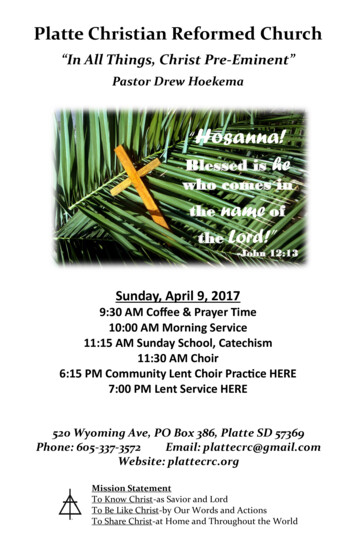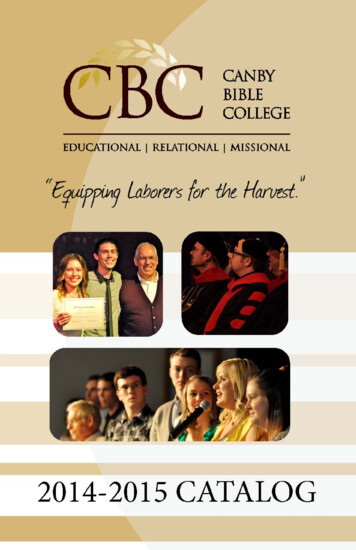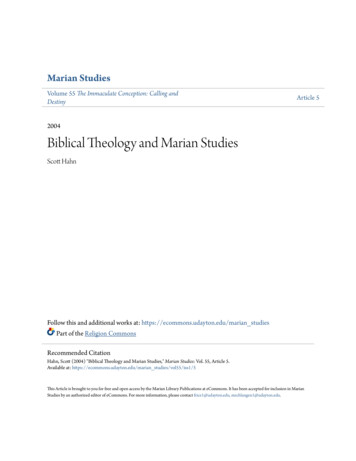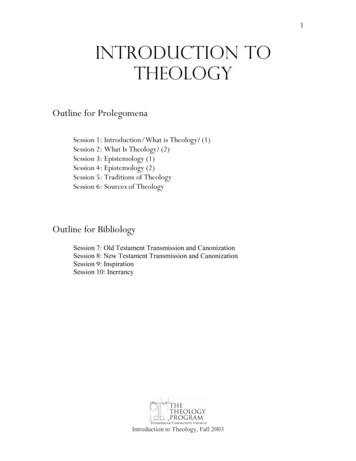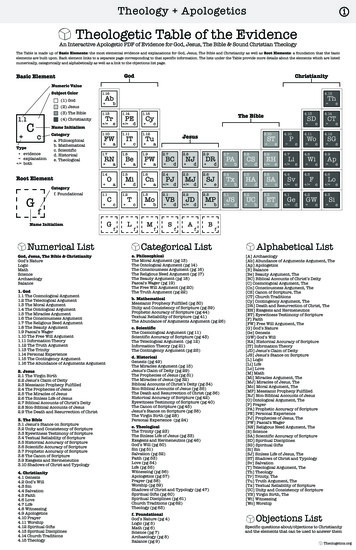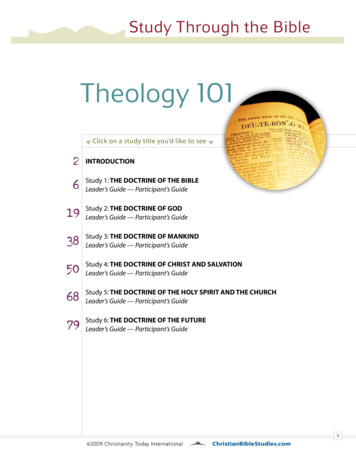
Transcription
Study Through the BibleTheology 101q Clickon a study title you’d like to see q2INTRODUCTION6Study 1: The Doctrine of the BibleLeader’s Guide — Participant’s Guide19Study 2: The Doctrine of GodLeader’s Guide — Participant’s Guide38Study 3: The Doctrine of MankindLeader’s Guide — Participant’s Guide50Study 4: The Doctrine of Christ and SalvationLeader’s Guide — Participant’s Guide68Study 5: The Doctrine of the Holy Spirit and the ChurchLeader’s Guide — Participant’s Guide79Study 6: The Doctrine of the FutureLeader’s Guide — Participant’s Guide1 2009 Christianity Today InternationalChristianBibleStudies.com
Theology 101IntroductionIntroduction“Then we will no longer be immature like children. We won’t betossed and blown about by every wind of new teaching. We will notbe influenced when people try to trick us with lies so clever theysound like the truth. Instead, we will speak the truth in love, growingin every way more and more like Christ, who is the head of his body,the church.” —Ephesians 4:14–15, NLTDefinitionsThe word theology is derived from two Greek words:(God)* Theos* Logos (speech or reason)Therefore, theology in its simplest terms is rational discussion about God.In Greek, the word theologia referred to discussions amongst the philosophers about divinematters. Plato called the stories of the gods “theologies.” Aristotle considered theology tobe the greatest of all scientific studies since its subject, God, was the highest reality. MarkBatterson would echo Aristotle’s thoughts in his claim that every “-ology” is a branch oftheology.B. B. Warfield promoted a classic definition as follows: “Theology is the science of Godand his relationship to man and the world.” In greater detail, it is the discipline which 1)presents a unified formulation of truth concerning God and his relationship to humanityand the universe as this is set forth in divine revelation; and 2) applies such truths to theentire range of human thought and life. (Evangelical Dictionary of Theology)Theology: the contents of the Christian faith as set forth in orderly exposition by theChristian community. (Renewal Theology, J. Rodman Williams)Theology: the attempt to reduce religious truth to an organized system. (EvangelicalDictionary of Theology)Systematic theology: any study that answers the question, “What does the whole Bibleteach us today?” This definition indicates that systematic theology involves collecting and2 2009 Christianity Today InternationalChristianBibleStudies.com
Theology 101Introductionunderstanding all the relevant passages in the Bible on various topics and then summarizingtheir teachings clearly so that we know what to believe about each topic. (Bible Doctrine,Wayne Grudem)Doctrine: What the whole Bible teaches about some particular topic. (Bible Doctrine,Wayne Grudem)Major Doctrine: one that has a significant impact on our thinking about other doctrinesor that has a significant impact on how we live the Christian life (examples: authority of theBible, deity of Christ, justification by faith).Minor Doctrine: one that has very little impact on how we think about other doctrinesand very little impact on how we live the Christian life (examples: differing views of thefuture, forms of church government, forms of communion and baptism).Paradox: a seemingly contradictory statement that may nonetheless be true (example: thedoctrine of the Trinity).Other DisciplinesBiblical Theology: historical development of theology throughout Scripture.Historical Theology: study of Christian doctrines as they have been considered at differentpoints in church history.Philosophical Theology: a study of theological topics largely without the use of theBible. Instead, philosophical tools, resources, and methods are used to organize theologicalthought (example: Paul Tillich’s Systematic Theology).Narrative Theology: a 20th-century development of theological thought predicated onthe idea that the Bible should be considered as narrative more than a system of theologicaltruth.Dogmatic Theology: a study of theology as set forth in the creeds, dogmas, andpronouncements of the church.Apologetics: a defense of the Christian faith for the purpose of instructing believers orconvincing unbelievers.Ethics: the application of God’s Word to real life situations, problems, and questions.3 2009 Christianity Today InternationalChristianBibleStudies.com
Theology 101IntroductionThree Sources of AuthorityBiblical* Traditionalist* Subjectivist*Initial PresuppositionsPresupposition: an assumption that forms the beginning point of any study.Bible is true and is the absolute standard of truth.* The* The God of the Bible exists, and he is who the Bible says he is.Why Study Theology?“It was he who gave some to be apostles, some to be prophets, some to be evangelists, and someto be pastors and teachers, to prepare God’s people for works of service, so that the body ofChrist may be built up until we all reach unity in the faith and in the knowledge of the Son ofGod and become mature, attaining to the whole measure of the fullness of Christ. Then we willno longer be infants, tossed back and forth by the waves, and blown here and there by everywind of teaching and by the cunning and craftiness of men in their deceitful scheming. Instead,speaking the truth in love, we will in all things grow up into him who is the Head, that is,Christ. From him the whole body, joined and held together by every supporting ligament, growsand builds itself up in love, as each part does its work.” (Ephesians 4:11–16)“Anyone who lives on milk, being still an infant, is not acquainted with the teaching aboutrighteousness. But solid food is for the mature, who by constant use have trained themselves todistinguish good from evil.” (Hebrews 5:13–14)(Ephesians 4:14)* Clarification(1 Timothy 1:3; 2 Timothy 4:3–5; Hebrews 5:13–14)* Correctionand Unification (Ephesians 4:13)* Declaration(Psalm 119:11; Matthew 28:19–20; 1 John 2:3)* Obedience(Ephesians 4)* ToGrowth* love and glorify God (Matthew 22:37; Philippians 1:9–11)How Should We Study Theology?4 2009 Christianity Today InternationalChristianBibleStudies.com
Theology 101Introduction(2 Timothy 3:16–17)* Biblicallyby the Holy Spirit (John 14:17; 16:13)* GuidedHumbly (2 Timothy 2:23–25; 1 Peter 5:5; James 1:19–20)* Withdiscernment (1 Corinthians 2:14; Ephesians 1:17–19)* In community(Proverbs 11:14; 1 Corinthians 12:27–28)* Prayerfully (Psalm* With application to119:18)life (1 Timothy 6:3; Titus 2:1)* With reference to churchhistory (context and perspective)* With worship and praise (Deuteronomy6:1–9; Psalm 119:14, 103, 111, 162)*The theology books that are quoted throughout this study are:Bible Doctrine, Wayne Grudem, Zondervan (July 1, 1999). Bible Doctrine takes a*highlycommended upper-level textbook on systematic theology and makes it accessibleto the average reader. Abridged from Wayne Grudem’s award-winning SystematicTheology, Bible Doctrine covers the same essentials of the faith, giving you a firm graspon seven key topics.Theology for the Community of God, Stanley Grenz, Wm. B. Eerdmans Publishing*Company(2000). Stanley Grenz presents the traditional themes of Christian doctrinewithin an emphasis on God’s central program for creation, namely, the establishmentof community. Masterfully blending biblical, historical, and contemporary concerns,Grenz’s respected work provides a coherent vision of the faith that is both intellectuallysatisfying and expressible in Christian living.Evangelical Dictionary of Theology, ed. Walter A., Elwell, Baker Academic; 2nd*edition(2001). “EDT is a work of responsible evangelical scholarship, judicious, andgenerally fair to all sides. It has no ax to grind, though it does have a position to present.And happily, this it does with an acceptable confidence.”—Christianity Today.Systematic Theology: a Pentecostal Perspective, Stanley M. Horton, Logion Press*(1994).If you are looking for a theology book that tells what the Assemblies of Godbelieves, then consider getting this book.5 2009 Christianity Today InternationalChristianBibleStudies.com
Theology 101The Doctrine of the BibleLeader ’s GuideL e a d e r ’s G u i d eThe Doctrineof the BibleThe Bible is the inspired Word of God.The Bible is God’s word to us. The Old and NewTestaments are verbally inspired by God, the onlywritten revelation from God to man. The Bible isinfallible and the authoritative rule of faith andconduct for mankind (2 Timothy 3:15–17;1 Thessalonians 2:13; 2 Peter 1:21). 1Scr ipt ure: 2 T imo t hy 3: 16 – 17 ; 1 Thes s alo nians 2: 13 ; 2 Peter 1: 21B ased On : “ Theolo gy 1 0 1 , ” by H e at h e r Ze m p e l , w r i t te n fo rNat io n al Co mmun it y Chu rc h.1From National Community Church Statement of Beliefs.6 2009 Christianity Today InternationalChristianBibleStudies.com
Theology 101The Doctrine of the BibleLeader ’s GuidePart 1Identify the IssueNo te to lea der : Provide each p erson with th e Par ticip an t ’s Guide,in c luded a t t he end of t his study.Wayne Grudem says in his book Bible Doctrine, “The authority of Scripture means that allthe words in Scripture are God’s words in such a way that to disbelieve or disobey any word ofScripture is to disbelieve or disobey God.”We accept the authority of the Old Testament because:* The religion of ancient Israel was founded upon the written words of the Old Testament.The concept of written revelation may have derived from God’s inscribing of the Ten*Commandments.*Hundreds of Old Testament writings begin with “Thus says the Lord” (examples: Exodus4:22; Joshua 24:2; 1 Samuel 10:18; Isaiah 10:24).Old Testament writings often indicate that God spoke through prophets (Jeremiah 37:2;*Zechariah7:7).* Jesus viewed the Old Testament Scriptures as authoritative (Luke 24:25; John 5:45–47).Timothy 3:16: All Scripture is inspired by God and profitable for teaching, for reproof,*for2correction,for training in righteousness. (The word Scripture comes from the Greek wordgraphe, which occurs in the New Testament 51 times. In each instance, it refers to the OldTestament writings.)We accept the authority of the New Testament because:1 Timothy 5:18: For the Scripture says, (a) “You shall not muzzle the ox while he is*threshing,”and (b) “The laborer is worthy of his wages.”(a) is from Deuteronomy 25:4; (b) is from Luke 10:7. Both are referred to as “Scripture.”2 Peter 3:15–16: And regard the patience of our Lord as salvation; just as also our beloved*brotherPaul, according to the wisdom given him, wrote to you, as also in all his letters,speaking in them of these things, in which are some things hard to understand, whichthe untaught and unstable distort, as they do also the rest of the Scriptures, to their owndestruction.Peter speaks of Scripture and Paul’s letters, showing a willingness to classify Paul’s lettersas Scripture.7 2009 Christianity Today InternationalChristianBibleStudies.com
Theology 101The Doctrine of the BibleLeader ’s GuideCorinthians 14:37: “If anyone thinks he is a prophet or spiritual, let him recognize that*the1thingswhich I write to you are the Lord’s commandment.”This verse is evidence that some New Testament writers were aware that their own writings werethe words of God. It seems that there was a general awareness that “additions” were being madeto Scripture during the writing of the New Testament. See also 2 Peter 3:2 and 1 Thessalonians4:15.Discussion Questions:[Q] Do you accept the Old and New Testaments as the Word of God? Why or why not?[Q] What questions do you have about the reliability of Scripture?Part 2Discover the Eternal PrinciplesTeaching Point One: The Holy Spirit convinces us that Scripture isauthoritative.The Westminster Confession of Faith includes the following:We may be moved and induced by the testimony of the Church to an high and reverentesteem of the Holy Scripture. And the heavenliness of the matter, the efficacy of thedoctrine, the majesty of the style, the consent of all the parts, the scope of the whole(which is, to give all glory to God), the full discovery it makes of the only way of man’ssalvation, the many other incomparable excellencies, and the entire perfection thereof,are arguments whereby it does abundantly evidence itself to be the Word of God: yetnotwithstanding, our full persuasion and assurance of the infallible truth and divineauthority thereof, is from the inward work of the Holy Spirit bearing witness by andwith the Word in our hearts (bold mine).[Q] If you can, give an example of when you’ve been persuaded by the Holy Spirit that aScripture passage is true.[Q] Do you think the above statement is a circular argument? Why or why not?Teaching Point Two: The authority of the Bible can be summed up bythree “in” words.8 2009 Christianity Today InternationalChristianBibleStudies.com
Theology 101The Doctrine of the BibleLeader ’s GuideThe first of these “in” words is inspired.[Q] How would you define the inspiration of Scripture—what do you think it means?Inspiration refers to the fact that the words of Scripture are spoken by God (Grudem, BibleDoctrine). The Evangelical Dictionary of Theology says that inspiration is a “supernatural influenceof the Holy Spirit upon divinely chosen men in consequence of which their writings becometrustworthy and authoritative.”The word inspired comes from the Greek word theopneustos, which literally means “Godbreathed.” Read 2 Timothy 3:16; 1 Thessalonians 2:13; and 2 Peter 1:21.[Q] If Scripture is God-breathed, how do you think he communicated it to the writers?[Q] How does knowing that Scripture is God-breathed affect that way you read the Bible?How does it affect the way you interpret what the Scriptures mean?Hebrews 1:1 says, “In the past God spoke to our forefathers through the prophets at many timesand in various ways.” So, what was the method?* God spoke directly to the writer (Rev. 2).* The author researched (Luke 1:1–3).* The Holy Spirit reminded the writer of events (John 14:26).Le a d er ’s
Theology 101 The Doctrine of the Bible Leader’s Guide part 1 Identify the Issue Note to leader: Provide each person with the Participant’s Guide, included at the end of this study. Wayne Grudem says in his book Bible Doctrine, “The authority of Scripture means that all the words in Scripture are God’s words in such a way that to disbelieve or disobey any word of Scripture is to .

